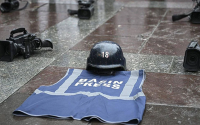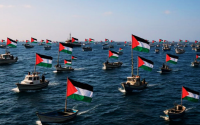23 November 2007Jonathan Watts
 Three generations of a Bangladesh family sit inside a makeshift shelter in Chailtatoli village on the south coast. Photograph: Farjana Khan Godhuly/AFP/Getty Collapsed homes, uprooted trees and inundated crops puncture the serenity of the view from the Bangladeshi Air Force helicopter as it approaches the site of the country's worst cyclone in more than a decade.
Three generations of a Bangladesh family sit inside a makeshift shelter in Chailtatoli village on the south coast. Photograph: Farjana Khan Godhuly/AFP/Getty Collapsed homes, uprooted trees and inundated crops puncture the serenity of the view from the Bangladeshi Air Force helicopter as it approaches the site of the country's worst cyclone in more than a decade.
After crossing high above mangrove forests, rivers and dusky swamps, the Russian-made MI17 swoops down towards the town of Jhalokati, drawing people running out of their homes towards the emergency landing pad in the local football stadium.
Word had got out that a new consignment of food, water and clothes was on its way to the hard-hit region.
Some were curious. Many others were desperate for the provisions sent by the World Food Programme (WFP) and paid for by international donors.
Police and soldiers kept the crowd at a distance as the chopper touched down and the 2.4 tonnes of high-energy biscuits and other aid was unloaded in less than 20 minutes.
Onlookers were patient but hungry. It has been a week since Cyclone Sidr struck and for some this is only the second time they have had outside help.
"We have no food, no clothes, no home. We have lost everything," said Henara Begom as her two-year-old son cried in her arms in a crush by the gate. "There are five people in my family. We haven't eaten for two days. We want to be strong so that we can rebuild our lives. But now we need help."
There are only 10 minutes before the chopper leaves. It must return to its base in the capital, Dhaka, before sunset as it is dangerous to land in the dark. But a man takes visitors outside the stadium to show the damage done to the community. As is the case throughout south-western Bangladesh, it is the poorest of the poor who are worst hit. Masonry "pukka" houses by the roads are relatively unscathed. But the families living in bamboo shacks at the edge of the river have suffered serious losses. At least 45 people have died here. Many others have lost their homes.
Submerged
At a rickshaw driver's shack the corrugated iron roof panels were torn off like strips of tinfoil. "The waters rose up and submerged our home," said the resident, as she stared up at the sky from what used to be her bedroom. "We need shelter more than anything."
It is becoming an urgent but familiar appeal after what was already one of the world's poorest nations was ravaged last Thursday by a cyclone that killed more than 3,100 people and left hundreds of thousands homeless and almost two million destitute.
Jhalokati is by no means the worst-affected region. More than 30km (19 miles) from the coast, it suffered less than the poor fishing villages and shrimp farms living on the sand bar islands closer to the Bay of Bengal.
International aid agencies say shelter is the biggest short-term priority, although clean water and medicine are also desperately needed to prevent a spread of waterborne diseases.
Tales of hardship fill the local media. "We don't have anything left. Everyone here, both the rich and the poor, has become a beggar," said Abul Kashem Hoalader, a politician from South Khali.
The Daily Star related the tale of a man who had been searching for his wife since he was knocked unconscious while holding her hand in the storm.
"I just found her body under the hyacinths in the canal," he said. "People are now tired of burying bodies and they are busy collecting whatever relief is available so I am not getting anyone to help me recover her body."
Relief workers described traumatic scenes as they visited areas that have previously been inaccessible.
"They are burying four or five people in a single grave. Homes are completely flattened, roads blocked and trees torn up," said Mokit Billah of Action Aid, who has just returned from the edge of the Sundarban, one of the worst-affected areas. "Yesterday I saw the body of a six- or seven-year-old child. A woman was running back and forth, crying, looking for her husband. There are so many poor and hungry people. So many dead bodies. I was crying. I have never seen anything like it in my life. The old people described it as the apocalypse."
There are stories too of heroism, tragedy and hope. In Kanainagar village a fisherman's wife - Shathi Sarkan - gave birth in a cyclone shelter as the winds howled around her. According to the Prothom Alo newspaper, locals have named her baby boy Sidr after the storm that they say brought something good among so much devastation.
A grimmer tale is told by the International Federation of the Red Cross, which mobilised 30,000 volunteers to spread advance warning about the cyclone with drums and loudspeakers, as well as dealing with its consequences.
One team leader, Anwar Hossain, reportedly spent hours warning residents in Patuakhali district to evacuate to shelters. But he was so busy helping others that when he returned to his own home he found his parents had been washed away by the tidal surge. His mother's body was later recovered.
The federation predicated 10,000 deaths, but they are now moving closer to the government's much lower estimate. It says, however, that the toll cannot just be measured in fatalities.
"It is not just about casualties and headcounts," said Devendra Tak, senior regional officer of the federation. "Half a million cattle have perished. There has been a huge effect on livelihoods. This is truly a disaster of large proportions."
Other aid groups, including Unicef, are working on the psychological damage to children.
Traumatised
"Some saw their relatives killed by trees that fell on their homes, or they saw dead bodies - something many of them had never seen before," Raphael Palma, of World Vision, told Associated Press. "They are still somehow traumatised and need support."
In the longer term the biggest need is for food, as some areas have suffered damage to 95% of their crops, many fishermen have lost their boats and the shrimp farms that are an important source of revenue in the worst-affected coastal region have been devastated.
The WFP is asking for almost $30m (£15m) over the next three months to feed 2.2 million people. It would be a doubling of their existing operation in a country where a third of the 150m population subsist below the poverty line. Foreign governments have already pledged $200m. Saudi Arabia has led the donors, but India, Pakistan, Britain and other EU nations had offered large contributions. Two US navy vessels, the Essex and Kearsarge, each carrying 20 or more helicopters, will join the relief effort at the weekend.
It is much needed. According to reports aid is still not reaching most victims and there are fears that the increase in weak people drinking polluted water could lead to more casualties. Yesterday there were at least two reports of people dying from diarrhoea.
But it could be far worse. During the last major cyclone, in 1990, 143,000 people died. A similarly powerful storm killed half a million in 1970. The gradually declining toll is attributed to shelters, better warning systems, improved international aid and luck - this year's killer cyclone could have been much worse if it had struck at high tide in a crowded area rather than in low tide with impact diluted by the natural tree barrier provided by the Sundarbans.
A quarter of the Sundarbans, the world's biggest mangrove forest, was wiped out after suffering the full fury of the cyclone. The area has been designated by the UN as a world heritage site. The carcasses of about a dozen deer have been found, but conservationists said they were hopeful that the rare royal bengal tiger had survived.
After the misery and destruction of last week the mood is shifting towards hope and reconstruction.
The Bangladeshi Air Force pilot, who asked to remain nameless, said the situation on the ground was better than when he had first started relief missions in the immediate aftermath of the disaster. Roads are being cleared so it should soon be possible to supply food in larger quantities by truck. "I am glad to help," he said. "They have lost everything."
http://www.guardian.co.uk/naturaldisasters/story/0,,2215785,00.html






